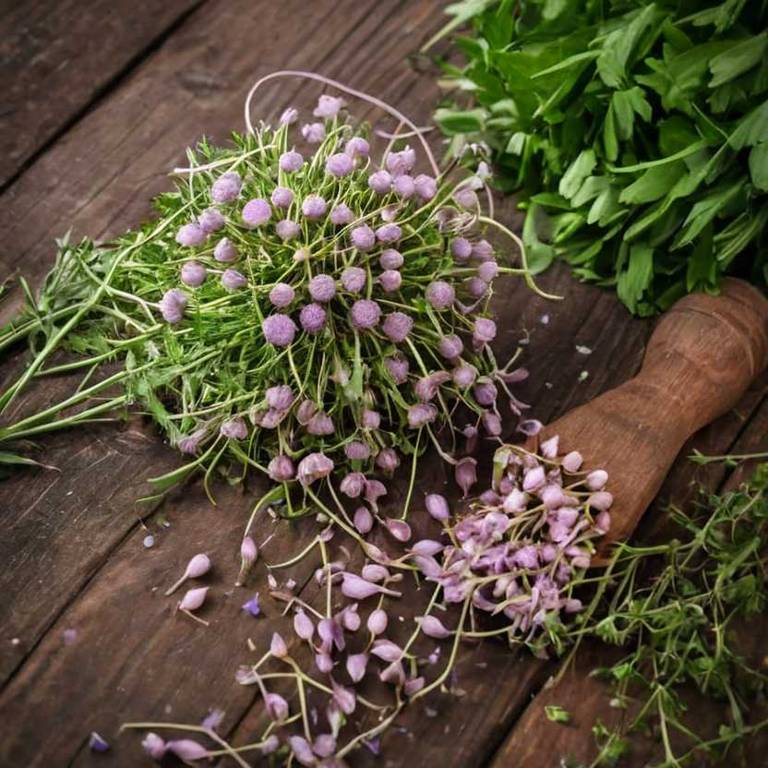By Leen Randell
Updated: Jul 07, 2024
What Are The Medicinal Properties Of Allium Schoenoprasum (Chives)?

Allium schoenoprasum, also known as chives, has health benefits such as reducing inflammation and improving digestion.
The herb contains volatile oils, flavonoids, and carotenoids, including quercetin and kaempferol, which are responsible for its medicinal properties. Chives can be consumed as a tea, capsule, or added to food as a fresh herb, allowing the medicinal constituents to be absorbed and utilized by the body. While generally considered safe, chives may cause allergic reactions in some individuals, particularly those with sensitivities to the Allium family.
Precautions should be taken when using chives, especially during pregnancy or breastfeeding, as they may stimulate uterine contractions.
This article explains the health benefits, active constituents, medicinal preparations, possible side effects, and precautions related to Allium schoenoprasum.
- What are the health benefits of Allium schoenoprasum?
- What are the active constituents of Allium schoenoprasum?
- What are the medicinal preparations of Allium schoenoprasum?
- What are the possible side effect of using Allium schoenoprasum improperly?
- What precautions to take when using Allium schoenoprasum medicinally?
What are the health benefits of Allium schoenoprasum?
Allium schoenoprasum, also known as chives, has health benefits such as reducing inflammation and improving cardiovascular health.
The rich content of vitamins and minerals, particularly vitamins K and C, make it an excellent source of antioxidants that protect against cell damage and oxidative stress. Additionally, chives have been shown to have antibacterial and antifungal properties, making them a natural remedy for various digestive issues.
They also contain compounds that may help lower cholesterol and blood pressure.
Here's a detailed article about the 10 health benefits of Allium schoenoprasum.
What are the active constituents of Allium schoenoprasum?
Allium schoenoprasum, also known as chives, has active constituents such as flavonoids, including quercetin and kaempferol, which possess antioxidant and anti-inflammatory properties.
Additionally, it contains volatile oils like allyl sulfide and allyl methyl sulfide, which have been shown to exhibit antimicrobial, antispasmodic, and expectorant effects.
These medicinal constituents contribute to the herb's potential health benefits, including its use in treating digestive issues and respiratory problems.
Here's a detailed article about the 10 active constituents of Allium schoenoprasum.
What are the medicinal preparations of Allium schoenoprasum?
Allium schoenoprasum, also known as chives, has medicinal preparations such as teas, infusions, and oils that are valued for their antiseptic and anti-inflammatory properties.
The herb is used to treat colds, fever, and respiratory issues, as well as to soothe digestive problems and skin irritations.
Chive oil, in particular, is rich in antioxidants and has been shown to have antimicrobial effects, making it a popular ingredient in natural remedies for wounds and infections.
Here's a detailed article about the 10 medicinal preparations of Allium schoenoprasum.
What are the possible side effect of using Allium schoenoprasum improperly?
Improper use of Allium schoenoprasum, also known as chives, increases the chances of experiencing side effects such as allergic reactions, digestive issues, and interact with medications.
Excessive consumption may cause stomach upset, diarrhea, and nausea. Additionally, people with bleeding disorders or taking anticoagulant medications should be cautious, as chives may enhance the risk of bleeding.
It is essential to consume chives in moderation and consult a healthcare professional for guidance.
Here's a detailed article about the 10 most common side effects of Allium schoenoprasum.
What precautions to take when using Allium schoenoprasum medicinally?
Before using Allium schoenoprasum, also known as chives, for medicinal purposes, you must take precautions such as consulting a healthcare professional to determine the correct dosage and preparation method.
Fresh chives may cause gastrointestinal upset if not properly prepared, and excessive consumption can cause allergic reactions, particularly in individuals with onion or garlic intolerance.
Additionally, pregnant or breastfeeding women should exercise caution when using chives medicinally.
Here's a detailed article about 10 precautions to take when using Allium schoenoprasum.